The case took seven years and went before seven judges but in the end, Detroit native Alphonse Maddin celebrated victory against the delivery firm that had fired him for seeking warmth after his truck broke down on a dangerously cold winter night.
Of the seven judges, six sided with Maddin but one found in favor of the company and wrote a scathing dissent.
That lone judge was Neil Gorsuch, who shortly afterwards made Donald Trump’s shortlist for the supreme court, to fill the seat left by the late Antonin Scalia. Gorsuch is now appearing on Capitol Hill at his confirmation hearings.
“In my heart of hearts I felt like he willfully tried to negate the human element of my case,” Alphonse Maddin, 48, told the Guardian .
“You learn in life to roll with the punches, but I’m concerned because the supreme court has the final say in this country’s affairs, and he’s shown a propensity toward the corporate sector in egregious cases like mine,” he said.
Maddin’s case is often brought up by critics seeking to expose Gorsuch as biased in favor of big business.
It has become known as “the case of the frozen trucker”.
In fact, Maddin had only been driving trucks for about three months, after his career as a graphic designer, serving clients ranging from the city of Detroit and banks to the “big three” US carmakers, had dried up in the great recession that began ahead of the financial crisis of 2008.
In January 2009, he was hauling a trailer of meat across rural Illinois at night. The truck was running on fumes when he pulled up at the side of the road after his company, Kansas-based TransAm, gave him muddled information about a refueling location.
With the temperature outside an Arctic-level -27F (-33C), the brakes on the 50-plus foot trailer (although not those in his cab) froze in the locked-on position. Maddin radioed in and was told to expect a repairman within the hour.
The engine was designed to be incapable of idling and the heater in the bunk area of the cab wouldn’t work.
“I bundled up in a blanket as best I could and lay on the bunk,” said Maddin.
He woke up three hours later with no sign of a repairman, blue with cold and numb.
“I couldn’t feel my feet,” he said. The temperature gauge inside the cab registered -14F.
He phoned a relative, his speech slurring – one of the symptoms of hypothermia. He climbed from the cab and could barely stand.
Calling the office again, he was given two choices. Try to drive away, dragging the wheel-locked trailer, or “sit tight”.
He figured the first was impossible, the second disastrous.
“I was afraid I was going to die,” he said.
He unhitched the cab from the trailer and despite being low on fuel managed to drive it to a gas station a few miles away, then, within 15 to 30 minutes, returned to find a repairman finally on the scene. After repairs, he delivered the meat.
But TransAm Trucking fired him for abandoning his load.
Maddin sued under a law that protects drivers who refuse to operate a vehicle in dangerous conditions.
Through a series of rulings in Maddin’s favor, which the company challenged, his case ended up before Gorsuch and two other federal appeals court judges on the powerful 10th circuit.
In August 2016, Maddin won. “I was happy, but also a little exhausted,” he said.
In the seven years since being fired, he had struggled to get consistent, decent-paying work, especially as his records said he had abandoned a load.
“That’s regarded as a cardinal sin in trucking,” he said. When he won his case, he was given backdated pay and the right to reinstatement. But he didn’t return to a company he felt had a “hiring and firing culture” and “had put its load over my life”.
Seven years of stress and poverty – he spent the time without a home of his own, staying with friends and relatives – damaged his relationship with his only child, a daughter who was nine when he was fired, he said.
Upon vindication, he didn’t even read Neil Gorsuch’s dissent until the judge was nominated for the supreme court.
“Then the first thing I noticed was that in his opening reference he simply called me a trucker and didn’t use my name,” he said.
While Maddin had largely won because he was deemed justified in putting his safety above the company’s instructions, Gorsuch disagreed because the law states that it protects someone refusing to operate their truck, whereas Maddin had in effect refused not to operate it, instead insisting on driving to reach shelter.
Gorsuch, like conservative supreme court justices John Roberts and Samuel Alito, is known as a constructionist – preferring to apply the exact text of a law and avoid interpreting it – and an originalist – a judge who prefers to rely on the US constitution in its original form.
Gorsuch’s dissent said it was not the judges’ job to decide whether the decision to fire Maddin “was a wise or kind one”.
“Our only task is to decide if it was an illegal one …. and … the law before us protects only employees who refuse to operate vehicles, period,” he wrote.
A worker attempting to use a broader interpretation of the law to protect his health and safety was no more a valid legal argument than someone using “an office computer not for work but to compose the great American novel”, he wrote, adding: “Good luck.”
He said that judges favoring Maddin leaned toward the so-called Chevron doctrine, where judges defer to government departments to interpret statutes, in this case the Department of Labor.
Gorsuch, who established conservative bona fides as a contemporary of Barack Obama’s at Harvard, is against the Chevron precedent, a landmark 1984 case that went in favor of a government regulator, which makes him popular with conservatives because it means his opinions tend to favor business over regulation.
Workers’ rights lawyer Bob Fetter, Maddin’s attorney, believes that Gorsuch’s strident dissent in his client’s case was the equivalent of advertising himself to Trump.
“He went out of his way to be particularly inhumane in ruling against a worker who almost died trying to do the right thing,” Fetter said.
Gorsuch defended his decision at Tuesday’s hearing.
Karen Harden, of the National Federation of Independent Business, will testify in support of Gorsuch at the Senate on Thursday, arguing that his tendency to “take the law as it is written” offers important predictability.
“Uncertainty kills small business. Gorsuch doesn’t try to rewrite the law, he doesn’t view his job as a legislator,” she said.
When Gorsuch was nominated, the US Chamber of Commerce greeted the choice as “fantastic”.
Ed Mills, a policy analyst at investment and research company FBR, said business support for Gorsuch comes down not to his individual decisions in cases like Maddin’s but in principle to his “Chevron position”.
“Someone who would limit the power of the regulator is regarded as pro-business,” said Mills.
Maddin is not moved. He appeared at a press conference in Washington last week alongside leading Democrats, as well as other individuals affected in cases where Gorsuch ruled in favor of corporate interests.
“I consider my case a victory for the safety of our workers and the integrity of our nation,” he said.
Since he won his case, Maddin has completed a master’s degree in science, aeronautics and unmanned aerospace systems.
He is currently looking for work “anywhere in the world”, but designing vehicles, not driving them.
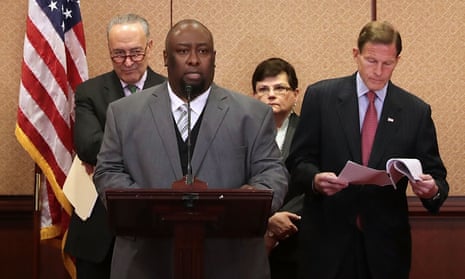
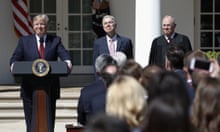
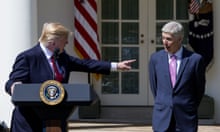

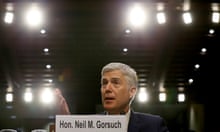
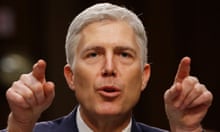
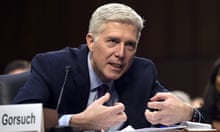
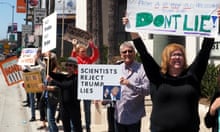
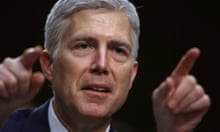
Comments (…)
Sign in or create your Guardian account to join the discussion